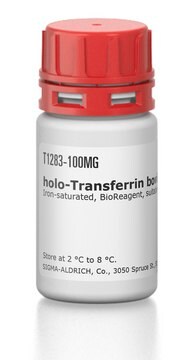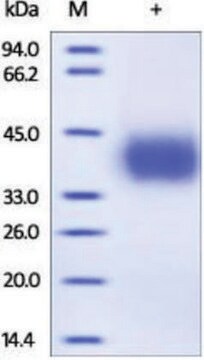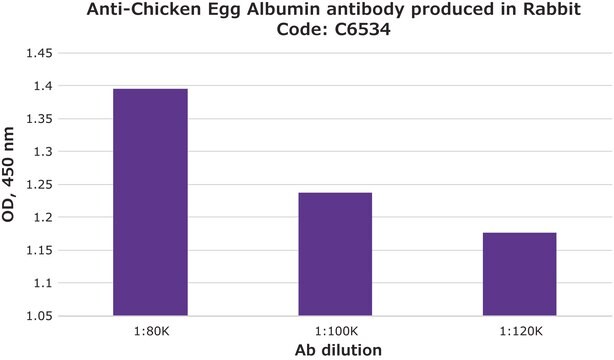ADD670C
HepaRG™ Thawing and Plating Medium Supplement with Antibiotics
Se connecterpour consulter vos tarifs contractuels et ceux de votre entreprise/organisme
About This Item
Code UNSPSC :
12352207
Nomenclature NACRES :
NA.71
Produits recommandés
Forme
liquid
Conditions d'expédition
dry ice
Température de stockage
−20°C
Description générale
Biopredic′s HepaRG Thawing and Plating Medium Supplement with Antibiotics can be used with all HepaRG cell lines.
HepaRG™ cells have the unique properties of maintaining significant levels of hepatic cell functions, of being CYP450 inducible, and supporting the complete replicative cycle of HBV.
HepaRG™ cells have the unique properties of maintaining significant levels of hepatic cell functions, of being CYP450 inducible, and supporting the complete replicative cycle of HBV.
HepaRG™ cells have the unique properties of maintaining significant levels of hepatic cell functions, being cytochrome P450 (CYP450) inducible, and supporting the complete replicative cycle of hepatitis B virus (HBV).
Application
HepaRG™ Thawing and Plating Medium Supplement with Antibiotics has been used as a supplement to culture HepaRG cells.
Informations légales
Use of this product is subject to one or more license agreements.
HepaRG cells are patented and their use is strictly limited; consider the cells as a single use, disposable product that must be destroyed upon conclusion of a study or experiment. Propagating, reproducing, cloning, subcloning or any other use of the cells following the conclusion of a study is prohibited. Use of the cells to produce or manufacture commercial products for general sale or for use in the manufacture of products intended for general sale is prohibited. Transfer of the cells to anyone not employed within the same organization, whether for financial benefit or not, is prohibited. If you are unwilling to accept the terms of this LIMITED USE LICENSE, do not ORDER or use them and immediately return the cells for credit. Violators of this Limited Use Licesense will be prosecuted to the fullest extent of the law.
HepaRG cells are patented and their use is strictly limited; consider the cells as a single use, disposable product that must be destroyed upon conclusion of a study or experiment. Propagating, reproducing, cloning, subcloning or any other use of the cells following the conclusion of a study is prohibited. Use of the cells to produce or manufacture commercial products for general sale or for use in the manufacture of products intended for general sale is prohibited. Transfer of the cells to anyone not employed within the same organization, whether for financial benefit or not, is prohibited. If you are unwilling to accept the terms of this LIMITED USE LICENSE, do not ORDER or use them and immediately return the cells for credit. Violators of this Limited Use Licesense will be prosecuted to the fullest extent of the law.
HepaRG is a trademark of BioPredic International company
Mention d'avertissement
Warning
Mentions de danger
Conseils de prudence
Classification des risques
Repr. 2
Code de la classe de stockage
12 - Non Combustible Liquids
Classe de danger pour l'eau (WGK)
WGK 3
Point d'éclair (°F)
Not applicable
Point d'éclair (°C)
Not applicable
Faites votre choix parmi les versions les plus récentes :
Certificats d'analyse (COA)
Lot/Batch Number
Désolés, nous n'avons pas de COA pour ce produit disponible en ligne pour le moment.
Si vous avez besoin d'assistance, veuillez contacter Service Clients
Déjà en possession de ce produit ?
Retrouvez la documentation relative aux produits que vous avez récemment achetés dans la Bibliothèque de documents.
Robin Mesnage et al.
Archives of toxicology, 92(8), 2533-2547 (2018-06-28)
Chemical pollutant exposure is a risk factor contributing to the growing epidemic of non-alcoholic fatty liver disease (NAFLD) affecting human populations that consume a western diet. Although it is recognized that intoxication by chemical pollutants can lead to NAFLD, there
Beth Williamson et al.
Pharmacology research & perspectives, 4(5), e00264-e00264 (2016-10-08)
The nuclear pregnane X receptor (PXR) regulates the expression of genes involved in the metabolism, hepatobiliary disposition, and toxicity of drugs and endogenous compounds. PXR is a promiscuous nuclear hormone receptor (NHR) with significant ligand and DNA-binding crosstalk with the
Catherine C Bell et al.
Drug metabolism and disposition: the biological fate of chemicals, 45(4), 419-429 (2017-02-01)
Reliable and versatile hepatic in vitro systems for the prediction of drug pharmacokinetics and toxicity are essential constituents of preclinical safety assessment pipelines for new medicines. Here, we compared three emerging cell systems-hepatocytes derived from induced pluripotent stem cells, HepaRG
Anika Mann et al.
Human cell, 30(4), 267-278 (2017-05-21)
HepaRG cells are widely used as an in vitro model to assess drug-induced hepatotoxicity. However, only few studies exist so far regarding their suitability to detect the effects of drugs requiring a preceding activation via the cytochrome P450 (CYP) system.
Yi Ni et al.
Methods in molecular biology (Clifton, N.J.), 1540, 15-25 (2016-12-16)
Investigations of virus-host interactions rely on suitable in vitro cell culture systems that efficiently support virus infection. Such systems should ideally provide conditions that resemble those of natural host cells, e.g., the cell-type specific signaling and metabolic pathways. For HBV
Notre équipe de scientifiques dispose d'une expérience dans tous les secteurs de la recherche, notamment en sciences de la vie, science des matériaux, synthèse chimique, chromatographie, analyse et dans de nombreux autres domaines..
Contacter notre Service technique







